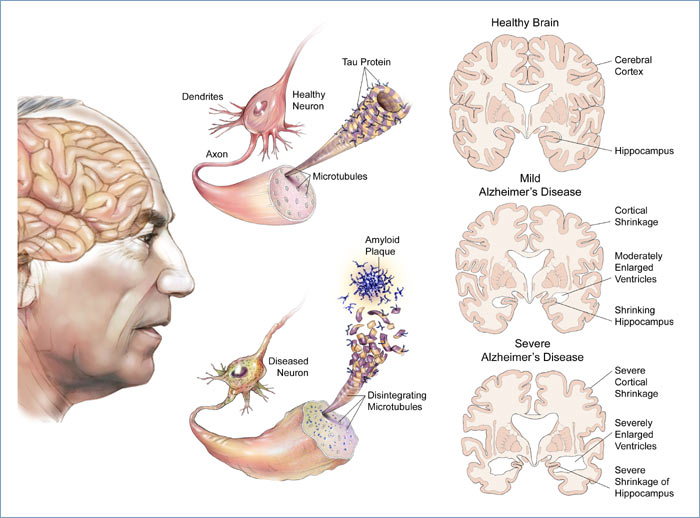SHARES

“My mom has Alzheimer’s disease. Her condition is getting worse. She needs help in bathing, toileting, and dressing. I’ve been taking care of her 24/7 for the past 6 months. Eventually, it gets difficult to even get her out in a wheelchair because she gets anxious easily, then wets or soils herself every now and then. The most painful part is to see her memory fade away day by day. She no longer remembers any of her children’s names. It hurts when she ask who am I and why am I in her house.” Lim, 56, a caring mother, wife and daughter – yes, she will forever be her mum’s loving daughter.
About Alzheimer’s Disease
In Alzheimer’s disease, the sufferer’s brain tissue shrinks over time. Alzheimer’s is also the most common underlying cause of dementia (long term loss of brain function). The part of the brain responsible for memory and navigation, hippocampus and entorhinal cortex, are affected the most. In later stage of Alzheimer’s disease, the entire brain tissue can shrink and this further impairs one’s language, thinking capability, attention, mood, personality, and even the ability to hold urine and stools.
As the disease progresses, the patient will invariably become more and more dependent on carers to carry out activities of daily life. Alzheimer’s disease is equally hard both for the sufferer as well as the carers. It is painful to see a loved one slowly losing himself/herself to the disease.
To date, scientists and doctors are still looking for a cure to Alzheimer’s disease. At best, treatments nowadays are to alleviate the symptoms, to delay and prevent the disease. It is generally believed that Alzheimer’s disease is part of ageing, but it is not. In fact, Alzheimer’s disease is related to a lot of health risks that are preventable.
Ways to Reduce Your Risk for Alzheimer’s Disease
1. Live an Active Life!
Research shows practising an active lifestyle would half your risk for Alzheimer’s disease. When we exercise, our heart pumps more blood to our brain, supplying more oxygen and nutrients required for the brain’s daily function, maintenance and repair. The recommended exercise regime is 30 minutes of moderate intensity exercise, 5 days in a week. The key is regular exercise. This keeps our heart pumping strong even at rest. Your body will feel warmer due to more blood circulation and higher metabolism rate. As a result, there is also higher blood circulation in your brain even when you’re not exercising. You can easily notice the effect as you look fresher throughout the day and your mind is sharp and quick.
2. Getting Enough Quality Sleep
Sleep is important for the brain to carry out its maintenance activity. In fact, we spend almost one-third of our life sleeping. The brain removes all the toxins that are stressful to the brain during sleep. It is found that lack of sleep is related to the built up of plaques (beta amyloids) in the brain. These plaques are responsible for various brain diseases like Alzheimer’s disease, dementia, Parkinson’s disease, etc. On average, we need about 7 hours of sleep everyday. The sleep should be uninterrupted to ensure good sleep quality. This is because it takes time for us to go under deep sleep, which is the phase of sleep that is restorative.
3. Eating a Healthy Diet
A diet rich in vegetables and fruits such as the Mediterranean diet is found to reduce risk for Alzheimer’s disease. These food which are rich in antioxidants can help reduce oxidative stress on our brain. Oxidative stress are known to drive our brain cells into suicidal mode, therefore leading to Alzheimer’s disease. In particular, eating a balanced diet low in refined carbohydrates, sugar, salt and fat can help prevent Alzheimer’s disease and dementia too. Avoiding unhealthy food keep high blood pressure and diabetes mellitus at bay, as these conditions do damage the vessels supplying blood to our brain.
4. Keeping blood pressure, blood sugar and blood cholesterol and body weight in check
High blood pressure, blood sugar and cholesterol all together cause damage to brain blood vessels putting us at higher risk for Alzheimer’s disease. In addition, these can also increase our chance for stroke. In the long run, multiple strokes will kill our brain cells and impair our brain functions (vascular dementia). Also, obesity is a risk factor for Alzheimer’s disease and various dementia. Keeping your body weight ideal not only helps you in controlling your blood pressure, sugar and cholesterol, it is also good for your brain and heart.
5. Quit smoking
Smoking puts you at 80% higher risk for Alzheimer’s disease. It also raises your risk level for stroke and vascular dementia (dementia caused by stroke). Slowly decrease the number of cigarettes you smoke in a day. Identify the situation you smoke the most and avoid those situation or try to substitute your cigarettes with other activities (eg. chewing gum). There are wide range of treatment to help you quit such as nicotine patch and gum.Your doctor is there to help you quit smoking.
Note that it is very normal for us to fail a few times before getting things right – you may fail several times in your effort to quit smoking, but that doesn’t mean you have lost!
6. Stress Management
Chronic stress, anxiety and depression can all increase your lifetime risk for getting Alzheimer’s disease. These take a toll on your brain and cause the accumulation of beta amyloids. Practice relaxation techniques such as deep breathing at time of stress. Be patient with yourself and give yourself time to identify your triggers and slowly adapt to it. Try to have fun and look at the cheerful and peaceful side of things. Make it a priority to have space and time for yourself. Learn to negotiate on your needs and others needs instead of blindly say yes or no. If things are getting out of control, make your mental health a priority and get help from your family, friends and doctor/counsellor!
7. Engage in social activities
Human are social animals and we don’t survive well in isolation. We have a need to care for others as well as being cared for. This gives us a sense of belonging which strengthen our social bonds. Maslow described these as basic human psychological needs for well-being. Living in isolation at old age increases our risk for Alzheimer’s disease. If you are using a wheelchair or walking stick, try exploring places with good amenities and accessibility. Spent you free time catching up with your friends, attending family gathering, community and religious activities to your liking. Sometimes, getting social can be as simple as a writing a letter to someone dear to you.
8. Get involved in mentally stimulating activities
Our brain is far more capable than we can ever imagine. In fact, we have so many brain cells that are not being fully utilised. That is why everyone of us is capable enough to train for super memory. In olden days, almost everyone in pursuit of academic studies has a super memory. This is because book and pen are hardly available and knowledge are mostly passed on by word of mouth and inscriptions. Therefore, you can train and improve your memory to fight off Alzheimer’s disease.
Various memory and learning techniques in olden days are still being used widely by people today who have superior brain memory, logic, calculation etc. It starts with truly believing in your brain power and potential. Memory works best in small groups with as much senses, emotions and imagination as possible.
For instance, “3j56” can be memorised together by imagining a huge magnificent “tree”(3) that you’re climbing on. You finally reach the canopy, made of… dancing rainbow “JELLY” (j)! Feeling so excited you touch it with an “open hand”(5), it feels sooo good! You then lick your palm FULL of intriguing Rainbow, a little. Yucks!!! It tastes so bad and you feel “sick” (6). Now, if this is the password to your friend’s apartment, you can’t help but see that magnificent tree again when you’re in front of the door.
Conclusion
Is the young wolf today taking care of the old wolf you will become one day? Photo by raheel MEMON from Flickr
Alzheimer’s disease can be miserable not only for the patient but also for the carers. It may seem like an endless struggle in a war that you don’t believe you’ll win at all. Maybe the cure will come one day like a knight in shinning armour. But, it is best to start picking up good habits from now on to prevent this war from ever starting.
Find a Neurologist in Malaysia, on GetDoc
Find a Neurologist in Singapore, on GetDoc
References:
1. Prevention of Alzheimer’s disease [Internet]. Alzheimer’s Association. Chicago. 2019. [Available from: https://www.alz.org/alzheimers-dementia/research_progress/prevention; last accessed on 2019 Jul 13]
2. Shaheen EL. Alzheimer’s disease [Medscape]. Web MD LLC. 2019. [Available from: https://emedicine.medscape.com/article/1134817-overview; last updated on 2019 May 9; last accessed on 2019 Jul 13]
by Chang Xian
View all articles by Chang Xian.
 Photo by MVY =] from Flickr
Photo by MVY =] from Flickr





